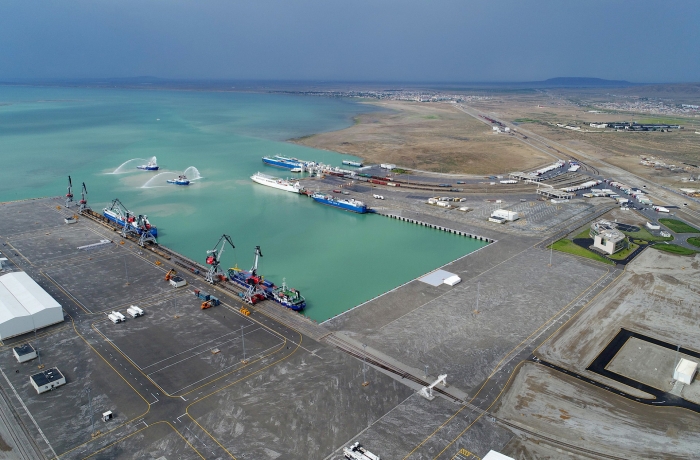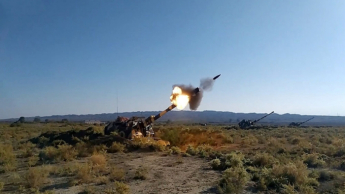Azerbaijan is destined to play a central role in Eurasian integration

|

Baku International Sea Trade Port, known also as Port of Baku / Evrascon
Azerbaijan's military victory over Armenia in last year's Patriotic War advances the goal Eurasian integration.
Azerbaijan's military victory over Armenia in last year's Patriotic War advances the goal Eurasian integration.
The Russian-mediated ceasefire agreement mandates the unblocking of all economic and transport links in the region, especially between the western region of Azerbaijan and the Nakhichevan Autonomous Republic.
Generally speaking, this also unlocks the South Caucasus' geostrategic destiny as the connectivity crossroads between the Central Asian Republics (CARs), Eastern Europe (Russia), and West Asia (Iran & Turkey). Such an ambitious vision is complemented by Azerbaijani President Aliyev's proposal to establish a six-nation regional integration platform between his country, Armenia, Georgia, Iran, Russia, and Turkey.
Prior to the conclusion of last year's conflict, the South Caucasus' connectivity capabilities were severely handicapped due to Armenian obstructionism in Karabakh. Important progress had still been made on facilitating Russian-Iranian trade through the North-South Transport Corridor (NSTC) and Turkish-Central Asian trade through the Middle Corridor that extends as far as China, but it was difficult to consolidate everything into a single regional platform due to the unresolved conflict. The ceasefire's mandate to unblock all economic and transport links in the region will greatly improve trade within in the South Caucasus and beyond to the three earlier mentioned neighboring regions.
This outcome perfectly aligns with one of the most important trends of the 21st century, Eurasian integration, which is being simultaneously advanced by Russia's Greater Eurasian Partnership (GEP) and China's Belt & Road Initiative (BRI). Observers should also pay attention to the stated intention of both Great Powers to synchronize their respective Eurasian integration efforts, which was agreed to between their heads of state. The gradual convergence of the GEP and BRI will stabilize Eurasia and most likely play out in Central Asia first before spreading throughout the rest of the supercontinent. It's here where Azerbaijan can take advantage of these trends as a result of its victory in last year's conflict.
Central Asia is geostrategically significant in the larger sense of Eurasian integration because it sits in between East Asia, Eastern Europe, Siberia, South Asia, the Southern Caucasus, and West Asia. Upon the inevitable consolidation of complementary Russian and Chinese connectivity efforts there, it's only natural that this process will shift towards the South Caucasus. After all, these two regions are already economically connected through trans-Caspian trade routes between Azerbaijan and Kazakhstan & Turkmenistan. Moreover, Russia and China also have an interest in replicating their envisioned connectivity successes in Central Asia in the South Caucasus in order to more closely connect that region with Eastern Europe and West Asia.
Slowly but surely, the geostrategic concept of the Eurasian Heartland is expanding from its erstwhile understanding as solely referring to Central Asia to nowadays include the South Caucasus as well. In other words, Azerbaijan's victory over Armenia last year and the resultant unblocking of regional economic and transport links will lead to the South Caucasus becoming just as geostrategically important for the rest of the supercontinent as Central Asia, which it will be more closely connected to due to the gradual expansion of coordinated Russian and Chinese integration projects from there to across the Caspian. In sum, this will eventually lead to the creation of a much more consolidated Eurasian economic space with time.
It's also important to remember that Azerbaijan is a member of the Economic Cooperation Organization (ECO), a regional integration platform that regrettably doesn't receive much attention from observers. That might soon change though as joint Russian-Chinese connectivity initiatives in Central Asia begin to take shape in the South Caucasus upon the inevitable linking of these two strategic regions. This will improve the importance of the ECO, perhaps making it a more significant player in these supercontinental integration processes. With that in mind, the ECO might more closely coordinate with the Shanghai Cooperation Organization (SCO) with which it shares many official members, observers, and dialogue partners.
The larger trend taking place is that China is expanding its influence westward across Central Asia and soon the South Caucasus while Russia is moving southward towards Muslim-majority states via what some can describe as its so-called "Ummah Pivot" of recent years. This is taking place as the US is rebalancing its focus from West Asia to East Asia via South Asia. All three Great Powers' attention is therefore converging in Central Asia and the South Caucasus, thus making these regions triply strategic. Although some might predict that this could turn them into centers of rivalry between those three states, the skillful practice of economic diplomacy by Azerbaijan and others might very well reduce those risks and result in mutually beneficial outcomes for all.
The author is a Moscow-based American political analyst.
(If you want to contribute and have specific expertise, please contact us at [email protected])
The Rocket and Artillery formations of the Azerbaijan Army conduct live-fire exercises in accordance with the combat training plan for 2021, the Ministry of Defense of Azerbaijan told Baku Tribune.
LAST NEWS






.jpg&h=67&w=67&zc=1&q=100)













